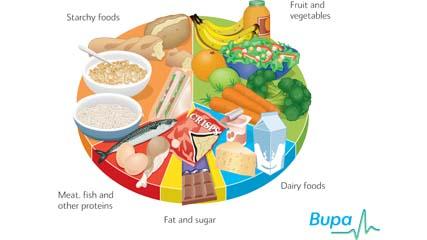Healthy eating

The amount and type of food you eat has a major influence on your health. If you eat a well-balanced diet, it can reduce your risk of various diseases as well as help you to maintain a healthy weight.
There are certain times when it can be particularly important to make sure that you follow a healthy diet, for instance, if you want to lose excess weight or if you're watching what you eat because you're pregnant. However, it's important to eat a healthy diet throughout your life, no matter what age you are – there's never a bad time to make some changes and improve your eating habits.
Why is healthy eating important?
A balanced diet
Getting the balance right
Improving your diet
Making changes
Why is healthy eating important?
There is good evidence that eating a healthy diet can reduce your risk of obesity and illnesses such as diabetes, heart disease, stroke, osteoporosis and some types of cancer.
The food you eat contains several different types of nutrients, which are all required for the many vital processes in your body. Key nutrients in your diet include the following.
- Carbohydrates provide you with energy.
- Proteins are another source of energy and essential for the growth and repair of all tissues in your body.
- Fats are a very concentrated source of energy and also have a number of other roles, including helping to transport essential vitamins around your body.
- Vitamins and minerals are important to keep your body healthy and functioning.
Another important element of your diet is fibre. Fibre isn't classed as a nutrient, but it's essential to keep your digestive system healthy and certain types of fibre can help to control your blood cholesterol levels.
A balanced diet
You need to eat a range of foods to get all of the nutrients and fibre your body needs. The five main food groups are:
- starchy foods, which include bread, pasta, rice and potatoes
- fruit and vegetables
- milk and other dairy foods
- meat, fish, eggs, beans and other non-dairy sources of protein
- foods high in fat or sugar
Eat the right balance of foods from these groups to make sure your body gets all it needs to stay healthy.
The image below shows proportionately how much food to eat from each of the different groups to enjoy a balanced and healthy diet. This includes everything you eat during the day, including snacks and drinks. You don't have to give up the less healthy foods you like, just adjust the amount of them you eat in proportion to the amount of healthy foods in your diet.

Improving your diet
Aim to eat three balanced meals a day with healthy snacks in between if you need them. Breakfast is important so don't skip it, especially if you're trying to lose weight.
Generally, if you want to improve your diet, there are certain foods to aim to eat more of and others that it's best to eat less of. Some examples are listed below.
Eat more:
- fruit and vegetables
- foods high in fibre, such as wholemeal and wholegrain bread, beans, pulses and potatoes with the skins on
- low-fat dairy products, such as semi-skimmed milk, low-fat cheese and yoghurt
- starchy foods, such as wholemeal rice, pasta and bread
Eat less:
- processed meat products, such as sausages, salami, meat pies and burgers – replace these with lean meat (with the skin and fat removed)
- foods high in salt, such as crisps and processed foods like ready meals and sauces
- sugary foods and drinks, such as fizzy drinks, sweets and biscuits
- high-fat foods, such as cream, butter and cakes
Making changes
It's important to make gradual changes to your eating habits. Don't be tempted to make drastic changes overnight or fall into the trap of making common dieting mistakes. Small, day-to-day changes will have a much bigger and more long-lasting effect.
If you're having trouble making changes to your diet or you're worried that you're not getting all of the nutrients you need, talk to a doctor. He or she may be able to give you some practical advice or refer you to a dietitian who can help you further.
Produced by Rachael Mayfield-Blake, Bupa Health Information Team, August 2012.
Improving your diet
Aim to eat three balanced meals a day with healthy snacks in between if you need them. Breakfast is important so don’t skip it, especially if you’re trying to lose weight.
Generally, if you want to improve your diet there are certain foods you should aim to eat more of and others that you should eat less of. Some examples are listed below.
Eat more:
- fruit and vegetables
- foods high in fibre, such as wholegrain bread, beans, pulses, potatoes with the skins on
- low-fat dairy products, such as semi-skimmed milk, low-fat cheese and yoghurt
- starchy foods, such as wholemeal rice, pasta and bread
Eat less:
processed meat products, such as sausages, salami, meat pies and burgers – replace these with lean meat with the skin and fat removed
- foods high in salt, such as crisps and processed foods such as ready meals and sauces
- sugary foods and drinks, such as fizzy drinks, sweets and biscuits
- high-fat foods, such as cream, butter, and cakes
Making changes
Changing your eating habits should be a gradual process. Don't be tempted to make drastic changes overnight or fall into the trap of making common dieting mistakes. Small, day-to-day changes will have a much bigger and more long-lasting effect.
If you're having trouble making changes to your diet or you’re worried that you’re not getting all of the nutrients you need, talk to your GP. He or she may be able to give you some practical advice or refer you to a dietitian who can help you further.
Keywords: healthy, eating, food, groups, nutrients, fibre, carbohydrate, protein, fat, starchy foods, fruit, vegetables
Further information
-
Food Standards Agency
www.foodstandards.gov.uk -
British Nutrition Foundation
www.nutrition.org.uk
Sources
- A healthy varied diet. British Nutrition Foundation. www.nutrition.org.uk, published 4 January 2012
- Dietary guidelines for Americans. US Department of Agriculture US Department of Health and Human Services. www.cnpp.usda.gov, published December 2010
- The nutrition source. Fiber: start roughing it! Harvard School of Public Health. www.hsph.harvard.edu, accessed 1 August 2012
- Starchy foods. Food Standards Agency. www.eatwellscotland.org, accessed 31 July 2012
- 8 tips for eating well. Food Standards Agency. www.eatwellscotland.org, accessed 2 August 2012
- Meat. Food Standards Agency. www.eatwellscotland.org, accessed 2 August 2012
- Carbohydrate. British Nutrition Foundation. www.nutrition.org.uk, published July 2009
- Being a healthy weight. Food Standards Agency. www.eatwellscotland.org, accessed 2 August 2012
This information was published by Bupa’s Health Information Team and is based on reputable sources of medical evidence. It has been peer reviewed by Bupa doctors. The content is intended for general information only and does not replace the need for personal advice from a qualified health professional.
















